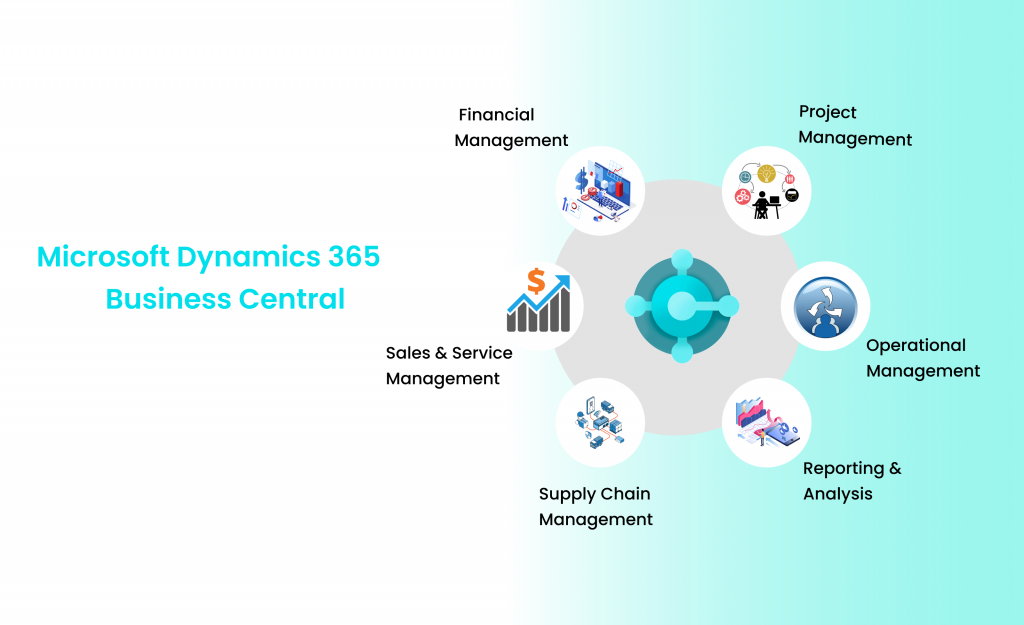What is Microsoft Dynamics 365 Business Central?

Microsoft Dynamics 365 Business Central, an upgraded version of Microsoft Dynamics NAV, is an all-in-one business management solution with CRM capabilities. It helps companies manage their finance, sales, and customer service efficiently. Small and mid-sized businesses predominantly use this ERP software because of its unified trait, which allows them to transform their entry-level accounting software into a comprehensive solution.
Here is an overview of the key features and functionalities of Microsoft Business Central:
- Financial Management:
Business Central provides comprehensive financial management capabilities, including general ledger, accounts receivable, accounts payable, fixed assets, and cash flow management. It allows for real-time visibility into your financial data. - Supply Chain Management:
Users can manage their supply chain operations, including procurement, inventory management, demand forecasting, and order processing. This helps in optimizing inventory levels and reducing costs. - Sales and Customer Service:
Business Central includes tools for managing sales processes, customer interactions, and service requests. It allows you to track leads, opportunities, and customer inquiries. - Project Management:
For businesses involved in project-based work, Business Central offers project management features to track project budgets, resources, and timelines. - Manufacturing:
Manufacturing companies can use Business Central to plan and control production processes, manage bills of materials (BOMs), and track work orders. - Business Intelligence and Reporting:
The system offers built-in business intelligence and reporting capabilities, including customizable dashboards and charts. It integrates with Power BI for advanced analytics and data visualization. - Integration:
Business Central can be easily integrated with other Microsoft products like Microsoft 365, Power Apps, and Azure services, as well as third-party applications and services through connectors and APIs. - Cloud-Based:
It is a cloud-based solution, which means users can access it from anywhere with an internet connection. This eliminates the need for on-premises hardware and allows automatic updates and scalability. - Security and Compliance:
Microsoft takes security and compliance seriously—Business Central benefits from Microsoft’s robust security measures and observations, such as GDPR and ISO 27001. Microsoft invests heavily in security measures for its cloud services. Business Central offers robust security features and compliance certifications, ensuring data protection and regulatory compliance. - Customization and Extensibility:
Business Central can be customized to meet specific business needs. Users and developers can create custom fields, tables, and extensions using AL (Application Language) and Visual Studio Code. - User-Friendly Interface: It offers a user-friendly interface with role-based workspaces, making it easier for different users to access the information they need.
- Mobile Access:
Business Central provides mobile apps for iOS and Android devices, allowing users to access business data and perform tasks on the go. - Subscription-Based Pricing:
Business Central is typically offered on a subscription-based pricing model, making it more affordable and predictable for SMBs.
With the ERP industry evolving constantly, the upgradation has also become an imminent factor. As cloud-based functionalities have become more of a contemporary solution, organizations have shifted their focus toward them solely because of the advanced capabilities they bring along. One of those ERP solutions is Microsoft Dynamics 365 Business Central.
Dynamics 365
Business Central Advantages Benifits:
Business Central integrates various business functions, such as finance, sales, customer service, inventory, and more, into a single platform. This unified approach enhances data visibility and collaboration among different departments.
Business Central automates various business processes, reducing manual data entry and minimizing errors. This leads to increased operational efficiency and reduced administrative overhead.
The solution offers robust reporting and analytics tools, allowing users to create custom reports, dashboards, and KPIs. This helps businesses gain insights into their performance and make data-driven decisions.
The system enables businesses to optimize inventory levels, track items, manage reorder points, and streamline supply chain processes. This helps reduce carrying costs and minimize stockouts.
As businesses grow, Business Central can scale to accommodate increased transaction volumes, user counts, and additional functionalities. This scalability helps companies adapt to changing needs without significant disruptions.
Microsoft continuously releases updates and new features for Business Central, ensuring users can access the latest technologies and improvements.